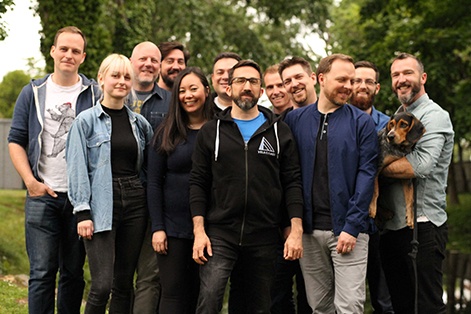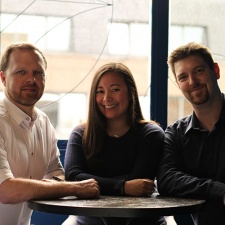Another day, another group of developers leaving the world of triple-A and setting sail under their own flag. This time it's (pictured left to right) Travis George, Lisa Newon George and Brian Kaiser, veterans of EA and Riot Games, who established a new studio in Dublin called Vela in 2018.
The team's goal is simple: to see how they can push the envelope with co-operative multiplayer games. We caught up with them at Develop:Brighton to find out more.
So what was the thinking behind Vela?
Travis George: We all have long experiences in and around game development; different teams, different sizes, a lot of triple-A. We've all worked together at various points and we started having a conversation at the right time about what we want to do; let's do something new. We sat down and started talking about what that is and this idea of creating something around multiplayer and specifically multiplayer co-operative play at a studio where we can really be player-focused in a way where we actually mean it, which is making decisions based on what's best for players. Ultimately, we came to the conclusion as a collective that the best way to do this and go after what we want to do was to start our own company as opposed to going to another and trying to change what they are doing or reinventing something. That really happened about a year-and-a-half ago. The timing was right. We shuffled around our lives and Vela Games came to be.
You raised €3.4m ($3.8m) in seed funding. What has this allowed you to do that you might not have been able to do otherwise?
Lisa Newon George: It's really allowed us to focus on building a world-class team. We've been able to recruit and eventually bring on folks that we may not be able to have those conversations with if we didn't have the extra support to build what we had in mind.
Brian Kaiser: One of the most important things in seeking out our initial partnership was usually there has to be three things to be considered when you're talking about fundraising are the amount you are raising, the terms and where or who the money is coming from. We got some very good advice when we were starting out and actually made the deliberate decision to invert those and look for partnerships first and then think about the terms and make the amount work after that. One of the other things that we get with these partnerships is autonomy. We've brought together this awesome team and we have deliberately searched for people that were excited about the challenge ahead of us and are ready to explore those so when we can succeed and provide something that players really feel is genre-defining and really satisfies what they're looking for in the multiplayer space, we know that we are able to get there on our own. If we don't get there, then we know that did in our own way. It wasn't from outside influences that maybe pushed us in directions we didn't want to go.
Right now you're 13 people. Is that the shipping size of the team or do you want to grow more?
George: We're at a really good transition point right now. We've got this first phase of the company, we've done a lot of the company stuff. There's a shocking amount of things to do around building a games studio that's not actually building a game. We're in pre-production at the moment. We're looking for one more member of staff in addition to our current 13 employees and then that'll be the team we've hand-selected on skills and expertise and experiences before to really crack this innovative gameplay that we're trying to build. We'll keep the team at that size and when we are ready to go into the next phase of production and eventual scale and launch, we'll grow the team from there. It's not a shipping size of 14 people though. Several multiples of that, probably.

At Gamescom 2017, I spoke to Mikkel Martin Pedersen from Deep Rock Galactic developer Ghost Ship Games, who described co-op multiplayer as "underdeveloped". How do you see these kinds of games right now?
George: When was the last time we had a super popular and deep co-op game that you could play with your friends for as much as you wanted? Someone told us recently that it was Left 4 Dead 2, which is a great co-op game, but it came out ten years. We do think there's room for this.
Kaiser: "Underdeveloped" isn't a bad term. Co-op is something that we're all personally passionate about. From the very beginning, looking at the multiplayer space, we've thought about what players are really looking for. There is a real opportunity to evolve the multiplayer space. We love multiplayer games, we have experience making them as well as playing them. But the opportunities for something that satisfies a lot of the same great things about multiplayer but are new and exciting really open up when you consider something that's co-op from the ground up through the whole experience. That's really exciting.
Newon George: We know from working in multiplayer in our past lives that players just love playing with their friends. They also love skilled-based mastery and they love achieving, whether that's winning or losing or something more meaningful. When you look at the Top 20 PC games, a lot of the time you see two things happening; the first is you see a lot of PvP or versus modes and then you see a lot of co-optional games. These are like PvE or role-playing games where they're really single-player experiences that have this tacted on multiplayer. We stepped back during that gear-up phase and we were looking at the market thinking that there really aren't any deeply-replayable exciting co-op games that are available to enthusiast gamers today. If so, they've been around for ten years plus. We know that players love playing together and we know they love all these other things. Maybe there is space for us to really do something new and interesting. That's how we got on this track and since then we've been doing a little bit of work to really understand the audience that we think this will really appeal to. We definitely do think there is room for innovation in this space.
At GDC this year, I met Chet Faliszek and Dr Kim Voll from Stray Bombay Company, who are also looking at the co-op multiplayer genre and how they can improve it with machine learning and Ai. That's their vision for the future of these kinds of games. What is yours?
George: We don't think of co-op as a genre, it's a way of interacting. There's lots of space inside of that for different co-operative experiences in different gameplay styles and genres to emerge. What I'm excited about is more and more co-operative play as a way of interacting together; designers and development teams sitting down and thinking how we can create this really epic experiences that we have through these co-operative moments with our friends, getting better and winning through this lens of co-operative play from the very beginning. One of the tricks is that you can't just go into existing games oftentimes and remove other players or go in and say we're going to do a game that does Destiny's strikes or Raids or something and we're going to write an algorithm that will generate a thousand strikes and the amount of time it would take to hand-curate. The problem isn't that simple; you have to go back from the beginning. It's really exciting for us to hear other people talking about their vision for co-operative play. We're excited about that as a whole and moving in that direction. We'll see a lot of different experiences but they're built from the ground-up to key in co-operative play.












